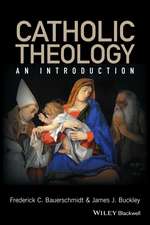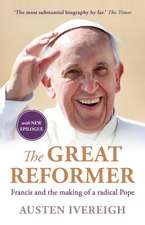In Lubianka′s Shadow – The Memoirs of an American Priest in Stalin′s Moscow, 1934–1945
Autor Léopold L. S. Braun Aa, G. M. Hamburgen Limba Engleză Hardback – 14 oct 2006
Preț: 264.99 lei
Nou
Puncte Express: 397
Preț estimativ în valută:
50.70€ • 52.94$ • 41.97£
50.70€ • 52.94$ • 41.97£
Carte tipărită la comandă
Livrare economică 05-19 aprilie
Preluare comenzi: 021 569.72.76
Specificații
ISBN-13: 9780268021993
ISBN-10: 0268021996
Pagini: 454
Ilustrații: 16-page gallery
Dimensiuni: 152 x 229 x 25 mm
Greutate: 0.77 kg
Ediția:1st Edition
Editura: MR – University of Notre Dame Press
ISBN-10: 0268021996
Pagini: 454
Ilustrații: 16-page gallery
Dimensiuni: 152 x 229 x 25 mm
Greutate: 0.77 kg
Ediția:1st Edition
Editura: MR – University of Notre Dame Press
Recenzii
“The Assumptionist priest Léopold Braun . . . was right about Soviet responsibility for the Katyn massacre, Soviet post-war intentions and the squalid realities of a police state . . . in some passages-the desecrations, meetings with implacable secret police and an obtuse American ambassador, a soldier's wedding deep in the forest, and a visit by General de Gaulle (for which the church was repaired, properly lit and heated for twelve hours)-he shows us a strange, distant world.” —Times Literary Supplement, January 12, 2007
“Fr. Leopold Braun has long last received his due, some forty-two years after his death, with the publication of the memoirs of his long service to the American Embassy Community of Moscow and especially to his beloved Russian Catholic Community during the most trying of times and in the most dire of circumstances. . . . In Lubianka's Shadow is an honest, generally very accurate, though not completely unbiased, and true historical account of life and politics in Moscow and the Soviet Union during twelve years of grim government-sponsored terror and turmoil, and World War II.” —The Russian Review, vol. 66, no. 3, July 2007
“Braun's memoirs provide historians with a remarkable view into both how the Soviet state attempted to crush organized religion during the 1930s and how the Russian public reacted. Braun's account gives the reader some wonderful insights into Soviet life and religion during the Stalinist era. The most fascinating parts of the book deal with Braun's experiences. His critique is most powerful when he lets the evidence speak for itself.” —American Catholic Studies, vol. 118, No. 4 (2007)
“In Lubianka’s Shadow is the apt title given to the memoirs of Father Leopold Braun, A.A., the American Assumptionist priest who served in Moscow during the Stalin era at the Roman Catholic church of Saint Louis. . . The book gives us an eyewitness account of the fierce antireligious campaigns; of the dedicated faith of ordinary people; of the determination of the Soviets to destroy Father Braun by any means; of life under constant police surveillance; and a rare account of the panic that gripped the Soviet government as it packed up and fled east as the German forces drew near in 1941. . . “. —Catholic Historical Review, Vol.94, No.2, April 2008
Notă biografică
Léopold L. S. Braun, AA (1903–1964) was a member of the Assumptionist order in the United States.
G. M. Hamburg is the Otho M. Behr Professor of European History at Claremont McKenna College. He is the author of numerous books, including Boris Chicherin and Early Russian Liberalism, 1828–1866.
Descriere
In Lubianka's Shadow chronicles the extraordinary life of a young American Catholic priest, Father Léopold Braun, who, as pastor of a Catholic church near the Lubianka political prison in the heart of Moscow, witnessed Stalin's purges, the Soviet government’s campaign against organized religion, and the destruction of World War II. These memoirs, recently discovered in the archive of Father Braun's Assumptionist order by Soviet scholar G. M. Hamburg, offer an intimate account of Father Braun's valiant effort to uphold Christian worship in the only Catholic church allowed to operate in Stalin's Moscow.
Posted to Moscow in 1934 as chaplain of the United States embassy, Father Braun served the embassy staff and local parishioners in the Saint Louis des Français Church at a moment when Stalin's anti-religious campaign was reaching a crescendo. He describes the Soviet government's intimidation and arrest of his parishioners, police surveillance of the church building, and personal harassment designed to force him out of the country. Father Braun's responses to these pressures—sometimes amusing, sometimes heart-rending, but always intelligent and soulful—tell us much about the capacity of ordinary people to respond to extraordinary circumstances. Braun also gives us a touching perspective on the harsh daily lives of Moscow's common people. He reports in detail on his visits to busy downtown stores, conversations in peasant markets on the city's outskirts, encounters with patients and medical staff in Moscow hospitals, and meetings with Soviet officials. Under his pen, Soviet society comes alive, with its citizens' poverty, cynicism, humor, and courage on full display. Accompanying the memoirs is an introductory, historical essay by Hamburg, who reveals from Father Braun's correspondence additional details of Soviet religious and political life. In Lubianka's Shadow is required reading for anyone interested in modern Russian history and for those concerned about the survival of religious faith under political assault.
"This is an astonishing memoir: astonishing for the story it tells of the ordeal of an American priest in sustaining the only Catholic church in Moscow during the terrible years of the Great Terror and World War II; astonishing for its account of 'Soviet reality' in those years, perhaps unparalleled in range and depth among foreigners' memoirs of this period; and astonishing for the author's unsuccessful attempts to get his Moscow memoir published during his lifetime, as recounted in Gary Hamburg's expert introduction." —Terence Emmons, emeritus, Stanford University
“This memoir is one of the most remarkable historical documents to come to light in an era of major archival revelations in Soviet history. Because of the unique nature of the circumstances of Father Braun's tenure in Moscow, his memoir reveals a previously unilluminated side of Soviet existence. Father Braun's personal commitment and courage enabled him to achieve a familiarity with Soviet society and officialdom that leads to incidents, by turns, movingly affirmative of human capacity for nobility and selflessness, chillingly reminiscent of the worst sides of human nature, amusing in a Kafka-esque fashion, and breathtaking from an historian's perspective for the internality and intimacy they reveal.” —Thomas Sanders, United States Naval Academy








